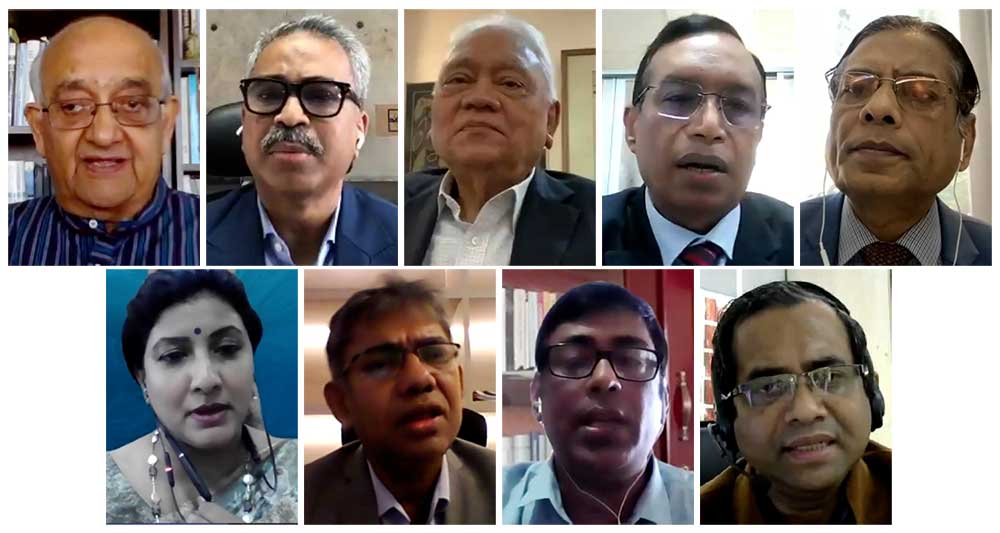Bangladesh’s graduation from the least developed country (LDC) category, scheduled for 2026, and middle income graduation (from LIC to LMIC in 2015) are indicative of the country’s resilience as well as success in terms of key socio-economic indicators. Bangladesh looks forward to taking advantage of its strengthened position to reap the benefits of LDC graduation. However, as the UN resolution says, graduation is only a milestone, not the destination of a nation’s journey. While welcomed, graduation will pose several new challenges on Bangladesh in view of channelling efforts towards a sustainable graduation.
For Bangladesh, all routes matter as the country moves towards 2026. The 12th WTO Ministerial Conference (MC12) is one of the possible and very important routes. At the MC12 to be held from 30 November to 3 December 2021, Bangladesh should pursue the proposal submitted by the LDC group for extension of the International Support Measures (ISMs) for 12 years. That will further provide an additional window to ensure a graduation with momentum and sustainability. Bangladesh should take part in MC12 by taking cognisance of its three identities as an LDC, as graduating LDC and as future developing country. However, the key will be to prioritise the domestic homework in areas of reforms, institutional strengthening, infrastructure and capacity building, technological transformation, and skills enhancement and human capacity building to ensure the transition from preference-driven competitiveness to skills- and productivity-driven competitiveness.
These observations emerged at the virtual dialogue on Upcoming MC12: Bangladesh’s Expectations and Possible Stance, held on Thursday, 18 November 2021. The dialogue was jointly organised by the Centre for Policy Dialogue (CPD) and Friedrich-Ebert-Stiftung (FES), Bangladesh Office.

Professor Mustafizur Rahman, Distinguished Fellow, CPD made the keynote presentation. His presentation recommended to gear Bangladesh’s strategies from preference-driven competitiveness to productivity and skills-driven competitiveness. Restructure incentives towards technology upgrading and skills formation, said Professor Rahman. Further recommendations included ensuring triangulation of trade, investment and transport connectivity with proper logistics and trade facilitation towards strengthening development of regional value chains and production networks, to take advantage of the Asian Century and to pursue strategic trade and investment policies towards sustainable LDC Graduation. Professor Rahman presented to put in place a Negotiating Cell, with adequate human and financial resources and backed by the needed analytical capacities, to design Bangladesh’s offensive and defensive interests and conduct the complex negotiations. He further added to negotiate with trading partners that matter, to get into CEPA type RTAs, with a view to attracting efficiency-seeking FDI, targeting the regional markets.
Mr Faruque Hassan, President, Bangladesh Garment Manufacturers and Exporters Association (BGMEA) was present as the Special Guest at the dialogue. He stated that the in post-graduation era, Bangladesh will have to face more competition as the country will eventually lose the preferential market access. Although, he shared that the RMG industry of Bangladesh has developed a strong backward linkage and will remain competitive in the international market even after graduation. Mr Hassan emphasised on the need for continued trade negotiation and domestic capacity building in view of the LDC graduation.
Bangladesh would genuinely graduate from the LDCs only after attaining a certain level of global competitiveness, said the Chair of the session, Professor Rehman Sobhan, Chairman, CPD. He recommended that trade negotiation and strategies should be approached not just in consideration of the graduation but also in consideration of the changing world order.
Speaking as a Discussant, Mr Md. Hafizur Rahman, Director General, WTO Cell, Ministry of Commerce, Government of Bangladesh shared that the graduation related submission will be given highest priority by the Bangladesh delegation at the MC12. Preferential market access and fisheries subsidy negotiation will be among negotiation priorities, stated Mr Rahman. Dr Nazneen Ahmed, Country Economist, United Nations Development Programme (UNDP), Bangladesh opined that the MC12 can be a platform for Bangladesh to uphold the situation of Bangladesh in the post-COVID period during the transition phase and seek support. She suggested that the sub-committee for smooth transition strategy should accumulate observations of all committees and present to the UN. The other Discussant, Dr Mostafa Abid Khan, Ex-Member, Bangladesh Trade and Tariff Commission also highlighted on keeping the graduation related discussions alive at the MC12.
The dialogue was moderated by Mr Syed Manzur Elahi, Treasurer, CPD Board of Trustees, Former Advisor to the Caretaker Government and Chairman, Apex Group. He shed light on how businesses from the LDCs struggle with proving capacity and credibility. Graduation from the LDCs would be advantageous in enhancing acceptability. Although graduation is not the only factor, rather increased productivity would play a vital role in terms of the competitiveness in the global market.
Dr Khondaker Golam Moazzem, Research Director, CPD and Mr Shadhan Kumar Das, Programme Co-ordinator, Friedrich-Ebert-Stiftung (FES) Bangladesh Office delivered the welcome remarks. The dialogue was also attended by high-level policymakers, academics, development practitioners, business leaders, civil society activists, international development partners and journalists.

